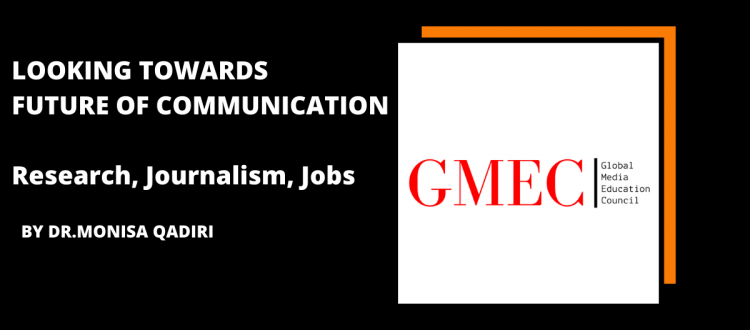Looking towards Future of Communication: Research, Journalism, Jobs – Mr. Qazi Salman (IIS)
Chief Guest, Mr. Qazi Salman (IIS) Director News Doordarshan Kendra Srinagar
Who was happy to be part of this session of GCEC highlighted the much-needed perspectives on reorienting the idea of communication and re-emergence of a progressive communicator. He noted the need for identifying the right kind of equation with the audiences for a reformed sense of communication paving the way for high-trust societies.
The pandemic has been unfolding slowly it has not been abrupt, Communication should have been the key aspect of government to deal with the pandemic.
We are seeing this emergence of fragmented communication bubbles where groups of people seem to be living in different information bubbles. Their presumptions, ideologies and conclusions are different which is a challenge that we as communicators are now facing, as to how to convince such people.
Our fundamental assumptions as media professionals always have been that given enough money and enough time, we will be able to convince everyone. That’s a fundamental assumption in all media backrooms because usually, media backrooms are the most undermanned institutions in any organisation.
The Covid-19 pandemic has put a lot of question marks on these assumptions. I think there are some more fundamental aspects of work that are not allowing even the best-esteemed media communication efforts to succeed.
In advanced democracies like America or Europe, there are significant populations and non-trivial percentage of the population which are totally rejecting the messages that are being given by their own government which are totally isolated from them even the societies which were earlier high-trust societies are slowly undergoing a third worldization of those societies in terms of communication. The reasons for this are obviously that the fundamental drivers for this phenomenon, the emergence of low trust societies are driven by the political economy and as communicators, we have a very indirect control in it.
Our communications are occurring in place when there is a steadily declining trust in the government and all kinds of organised institutions thereby we have to see how we shape our tools to counter that.
Another driver which has been alluded to by professor Rahman above is the increasing proliferation of internet penetration. From communicational aspects, this is an important thing since we cannot intervene in political economies but a lot of people are being socialised into consuming information and news as first-timers not on TV but through their mobile screens. For somebody who is born in 2005, it is very unlikely for them to access TV as the primary source of information. This also generates a mood towards tribalisation, a mood towards going to information bubbles in which one tends to stick to people who are much more homogeneous, whose ideological commitments and beliefs tend to coincide with their own. These bubbles will be very difficult to penetrate for any communication because, for someone leading into these bubbles, one is either a cryptocurrency guide or a fiat currency guide.
These challenges are going to be more acute. As people who were earlier socialised into getting information from TV or other sources, cable TV has been often seen as a revolution in news but the penetration of mobiles and the way we consume our information has been fundamentally changed by mobiles and is rather a much more significant revolution. As compared to that the proliferation of newspapers or cable networks was very evolutionary, with the same pattern but on a different quality.
The new generation is now socialised exclusively on their mobile screens to get their information and entertainment. These are also driving towards scenarios in which there are competing universes of information and those universes tend to be very exclusive now.
As communicators, we have to embrace and know how to operate these changes, develop our tools to operate these changes in communication scenarios.
The bottom line is that the researchers, media students, media institutions have to find ways in which people can communicate in low trust scenarios.

